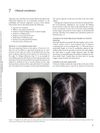 December 2021 in “Indian Journal of Dermatology, Venereology and Leprology”
December 2021 in “Indian Journal of Dermatology, Venereology and Leprology” Men with androgenetic alopecia, or hair loss, often have abnormal blood flow in their small blood vessels, which might be linked to inflammation and stress.
[object Object]  16 citations,
March 2013 in “JAMA Dermatology”
16 citations,
March 2013 in “JAMA Dermatology” A cancer drug called nilotinib might cause hair loss due to inflammation around hair follicles.
 2 citations,
January 2023 in “Pharmaceuticals”
2 citations,
January 2023 in “Pharmaceuticals” Sex and sex hormones can affect brain inflammation in Parkinson's disease, with male mice being more affected and female mice showing a protective effect.
1 citations,
December 2019 in “Clinical ophthalmology” Bimatoprost eye drops make rabbit eyelashes longer, thicker, and darker, and increase the number of lashes without causing inflammation.
 142 citations,
January 2019 in “Frontiers in Neuroendocrinology”
142 citations,
January 2019 in “Frontiers in Neuroendocrinology” Postpartum depression is linked to changes in brain chemicals, inflammation, stress, and certain genes, and can potentially be identified by markers like specific steroids, serotonin levels, and vitamin D levels.
 51 citations,
January 2004 in “Skin Pharmacology and Physiology”
51 citations,
January 2004 in “Skin Pharmacology and Physiology” The document explains hair growth and shedding, factors affecting it, and methods to evaluate hair loss, emphasizing the importance of skin biopsy for diagnosis.
 15 citations,
October 2012 in “InTech eBooks”
15 citations,
October 2012 in “InTech eBooks” Niosomes are a promising and effective way to deliver drugs through the skin.
10 citations,
June 2015 in “Seminars in cutaneous medicine and surgery” Hair loss can be caused by various factors, and treatments focus on restoring normal hair growth.
1 citations,
December 2016 in “Rossijskij žurnal kožnyh i veneričeskih boleznej” A new treatment using unactivated platelet leukocyte autoplasma cured 80% of non-scarring alopecia patients.
 1 citations,
April 2012 in “Informa Healthcare eBooks”
1 citations,
April 2012 in “Informa Healthcare eBooks” The conclusion is that detailed clinical descriptions help pathologists diagnose hair loss conditions more accurately.

Baricitinib helped treat a man's beard hair loss when steroids didn't work.
 November 2023 in “Journal of Cosmetic Dermatology”
November 2023 in “Journal of Cosmetic Dermatology” Injecting a person's own fat into their scalp may help regrow hair and improve hair thickness in different types of hair loss.
 November 2023 in “Translational Medicine Communications”
November 2023 in “Translational Medicine Communications” Derinat may improve hair growth and quality of life in hair loss patients by reducing oxidative stress.
 May 2023 in “Experimental Dermatology”
May 2023 in “Experimental Dermatology” RCM and OCT are effective for diagnosing and monitoring hair-related skin diseases but lack standardized protocols and need more research.
November 2021 in “SPAST Abstracts” The EFH-SLM cream is more effective and gentler for treating excessive hair growth in women.
[object Object]  16 citations,
February 2010 in “Journal of the European Academy of Dermatology and Venereology”
16 citations,
February 2010 in “Journal of the European Academy of Dermatology and Venereology” Fibrosing alopecia in a pattern distribution is a unique hair loss condition that may respond to antiandrogen therapy.
11 citations,
December 2021 in “Journal of Ginseng Research/Journal of ginseng research” Red ginseng oil is believed to have various health benefits and is safe, but more research is needed to fully understand how it works.
 10 citations,
January 2021 in “Journal of Ginseng Research”
10 citations,
January 2021 in “Journal of Ginseng Research” Red ginseng oil may help grow hair and protect skin from UVC light.
 December 2024 in “Deleted Journal”
December 2024 in “Deleted Journal” Herbal hair oils can reduce hair loss and improve scalp health.
 April 2024 in “Journal of applied cosmetology”
April 2024 in “Journal of applied cosmetology” Botulinum toxin shows promise for treating skin conditions but needs more research for safety and effectiveness.
 August 2024 in “Nature Communications”
August 2024 in “Nature Communications” Softer hydrogels help wounds heal better with less scarring.
2 citations,
February 2021 in “Developmental Cell” Middle-aged skin shows aging signs, and quercetin might help delay them.
 July 2024 in “Journal of Cosmetic Dermatology”
July 2024 in “Journal of Cosmetic Dermatology” Rose stem cell exosomes can significantly improve hair growth in androgenetic alopecia.
 92 citations,
January 1998 in “Dermatology”
92 citations,
January 1998 in “Dermatology” Ketoconazole shampoo improves hair growth and reduces oil similarly to minoxidil in male pattern hair loss.
 34 citations,
September 2019 in “Clinical, Cosmetic and Investigational Dermatology”
34 citations,
September 2019 in “Clinical, Cosmetic and Investigational Dermatology” Light therapy can stimulate hair growth and is more effective when started early, but more research is needed on its long-term effects and optimal use.
 9 citations,
April 2005 in “PubMed”
9 citations,
April 2005 in “PubMed” Older female squirrel monkeys often experience a type of hair loss similar to chronic telogen effluvium in humans.
 3 citations,
May 2018 in “Journal of nutritional health & food science”
3 citations,
May 2018 in “Journal of nutritional health & food science” Nutritional supplements can help manage hair loss and promote hair growth by strengthening hair roots and countering harmful effects of pollution, smoking, and deficiencies in vitamins and minerals.
 2 citations,
March 2022 in “Journal of Personalized Medicine”
2 citations,
March 2022 in “Journal of Personalized Medicine” Personalized medicine is important for treating skin disorders, with new treatments and connections to hormones and genetics being explored.
 January 2019 in “Springer eBooks”
January 2019 in “Springer eBooks” Platelet-rich plasma therapy may have benefits and is generally safe, but more research is needed to confirm its effectiveness and safety.
 April 2012 in “Informa Healthcare eBooks”
April 2012 in “Informa Healthcare eBooks” Telogen effluvium is a common hair loss condition where many hairs enter the resting phase, often not noticeable until significant loss occurs, and treatment focuses on the underlying cause.























